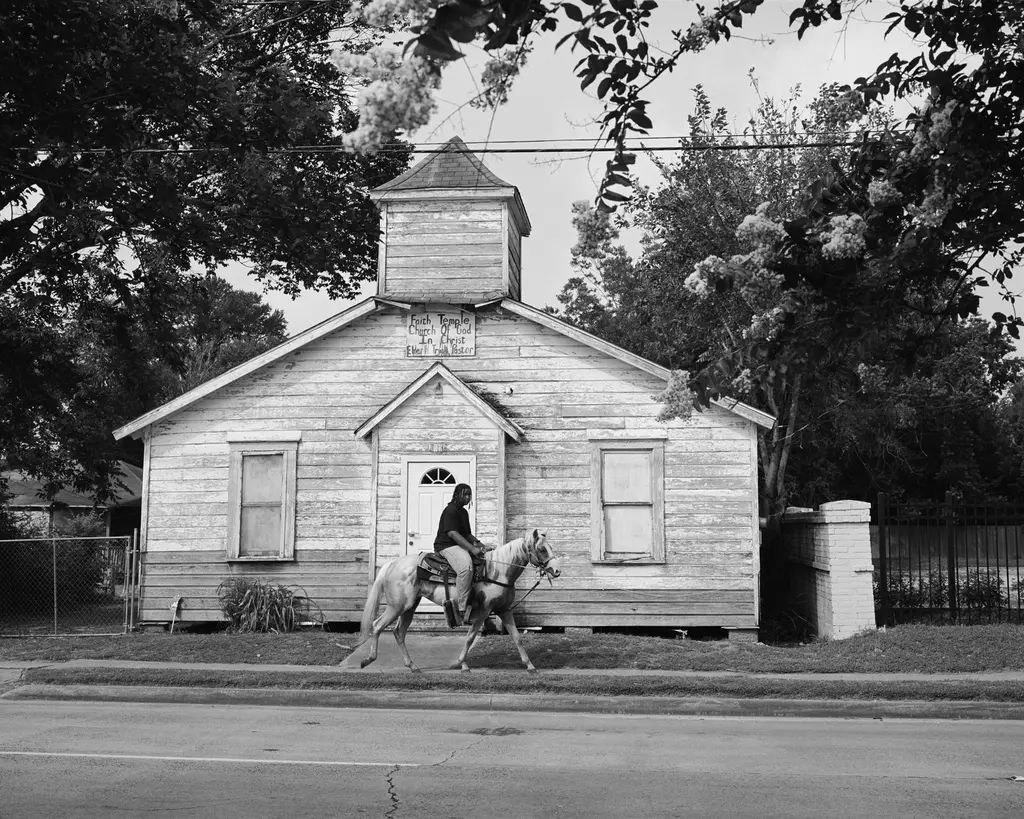Photos envisioning a world free from injustice
- Text by Miss Rosen
- Photography by Tyler Mitchell, Still from Idyllic Space, 2019 © the artist (main image)

Utopia is available to all who call upon their imagination to conjure the perfect world. And who better than the artist to visualise an escape from the infernal damnations of the earth and offer a visionary portrait of a future we might dare to dream into existence?
In ‘Utopia’, Aperture #241, artists, photographers, and writers come together to envision a world without prisons, sexism, racism, xenophobia, homophobia, environmental collapse – and all the other dangers pushing our very existence over the precipice.
Featuring the work of Nicole R. Fleetwood, The Family Acid, Lina Iris Viktor, Mickalene Thomas, Lorna Simpson, among others, Utopia offers a panoply of possible futures at our fingertips: a world without prisons, where people from all walks of life are free and unhindered by the spectre of oppression on every level of existence, starting with the relationship between artist and subject.

Tyler Mitchell, Untitled (Family Time in the Park), 2019 © the artist

Tyler Mitchell, Untitled (In the Blue Bush), 2018 © the artist
“Inherent to photography, especially when you think of it historically, is a strong hierarchy, where the photographer is the one with all the power, the one who is seeing. And the person being seen has almost no power,” Tyler Mitchell says of his work, which envisions Black liberation as the expression of peaceful repose, in an interview with Aperture.
“As a photographer, I ask myself, ‘What are the things I can do to lessen these inherent hierarchies in the photography-shoot structure of seeing and being seen?’”
Mitchell’s question underpins all the works collected here, which plumb the depths of our individual and collective imaginations to consider how a new world would look, and the role of photography in transcending the limitations of time and place.
The stories featured in Utopia offer new ways to consider the every day and the extraordinary as two sides of the same coin. Allen Frame’s 1981 photographs of the downtown New York scene just before the AIDS pandemic devastated a generation reminds us that utopia can be a matter of perspective about the here and now.

Biospherian candidates, 1990, from the film Spaceship Earth, 2020. Courtesy Matt Wolf

Biosphere 2, ca. 1991, from the film Spaceship Earth, 2020. Courtesy Matt Wolf
For American photographer Balarama Heller, utopia is “a personal and collective process, not an attainable external state”. In the 2019 series Sacred Place, currently on view in an online exhibition, Heller brings us to Vrndavana, a place of pilgrimage southeast of Delhi for the Hare Krishna movement, a faith in which he was raised during the 1980s.
Heller set out on the pilgrim road to encounter what mystery might be present, making photographs between three and six in the morning – a sacred time before sunrise where the boundary between the material and spiritual world is thin and porous. “The world has yet to assume its hardened shape made clear by the light of the sun and the energies of devotion are fuelled by the intimacy of the predawn darkness. Things take on an otherworldly glow and while the rest of the world sleeps, a divine presence is imbued in the most ordinary objects,” he explains.
Ultimately, utopia can be founded wherever we are, provided we are willing to do the work. As Heller observes, “The best we can do is be the change we want to see in the world, and that might just be enough to make the world a more equitable, sustainable place.”

Laurent Kronental, Denise, 81 years, Cité Spinoza, Ivry-sur-Seine, 2015 © the artist

Balarama Heller, Offer Nothing, 2019. Courtesy the artist

Allen Frame, Cady Noland and Butch Walker at the beach, from the series 1981, NYC, 1981. Courtesy the artist and Gitterman Gallery, New York

Amarise Carreras, el jíbare reza por amor (El jíbare prays for love), Queens, 2019. Courtesy the artist
Aperture’s ‘Utopia’ issue is available on their official website.
Follow Miss Rosen on Twitter.
Enjoyed this article? Like Huck on Facebook or follow us on Twitter.
Latest on Huck

Meet the trans-led hairdressers providing London with gender-affirming trims
Open Out — Since being founded in 2011, the Hoxton salon has become a crucial space the city’s LGBTQ+ community. Hannah Bentley caught up with co-founder Greygory Vass to hear about its growth, breaking down barbering binaries, and the recent Supreme Court ruling.
Written by: Hannah Bentley

Gazan amputees secure Para-Cycling World Championships qualification
Gaza Sunbirds — Alaa al-Dali and Mohamed Asfour earned Palestine’s first-ever top-20 finish at the Para-Cycling World Cup in Belgium over the weekend.
Written by: Isaac Muk

New documentary revisits the radical history of UK free rave culture
Free Party: A Folk History — Directed by Aaron Trinder, it features first-hand stories from key crews including DiY, Spiral Tribe, Bedlam and Circus Warp, with public streaming available from May 30.
Written by: Isaac Muk

Rahim Fortune’s dreamlike vision of the Black American South
Reflections — In the Texas native’s debut solo show, he weaves familial history and documentary photography to challenge the region’s visual tropes.
Written by: Miss Rosen

Why Katy Perry’s space flight was one giant flop for mankind
Galactic girlbossing — In a widely-panned, 11-minute trip to the edge of the earth’s atmosphere, the ‘Women’s World’ singer joined an all-female space crew in an expensive vanity advert for Jeff Bezos’ Blue Origin. Newsletter columnist Emma Garland explains its apocalypse indicating signs.
Written by: Emma Garland

Katie Goh: “I want people to engage with the politics of oranges”
Foreign Fruit — In her new book, the Edinburgh-based writer traces her personal history through the citrus fruit’s global spread, from a village in China to Californian groves. Angela Hui caught up with her to find out more.
Written by: Katie Goh

